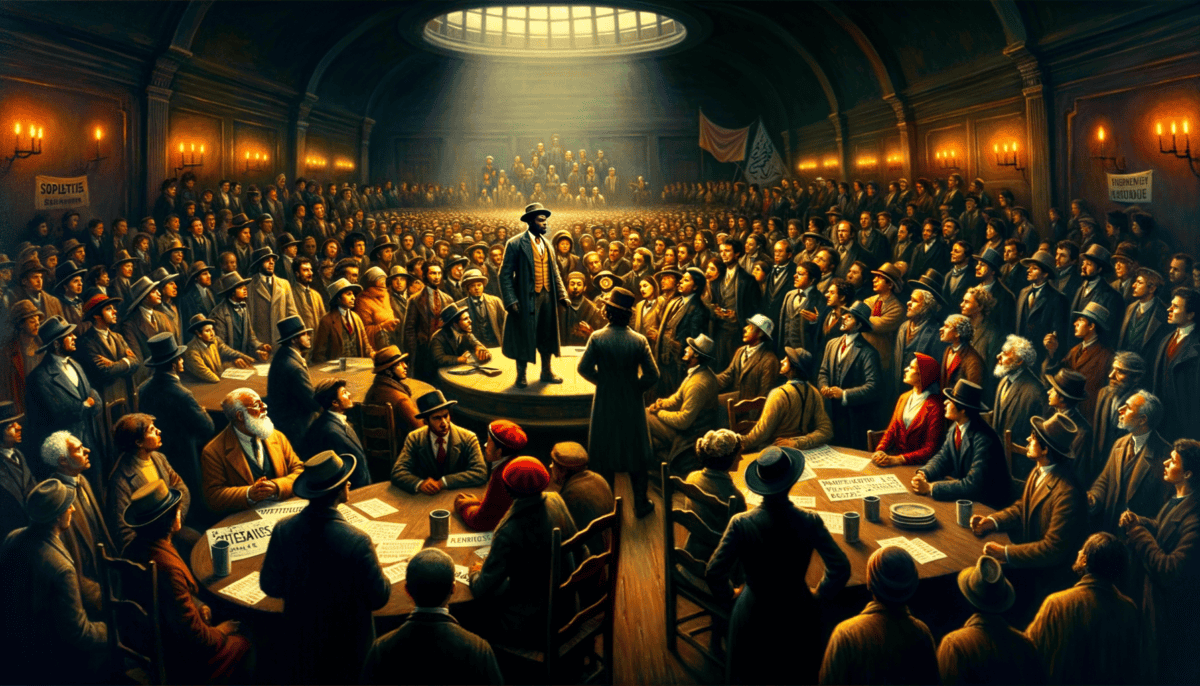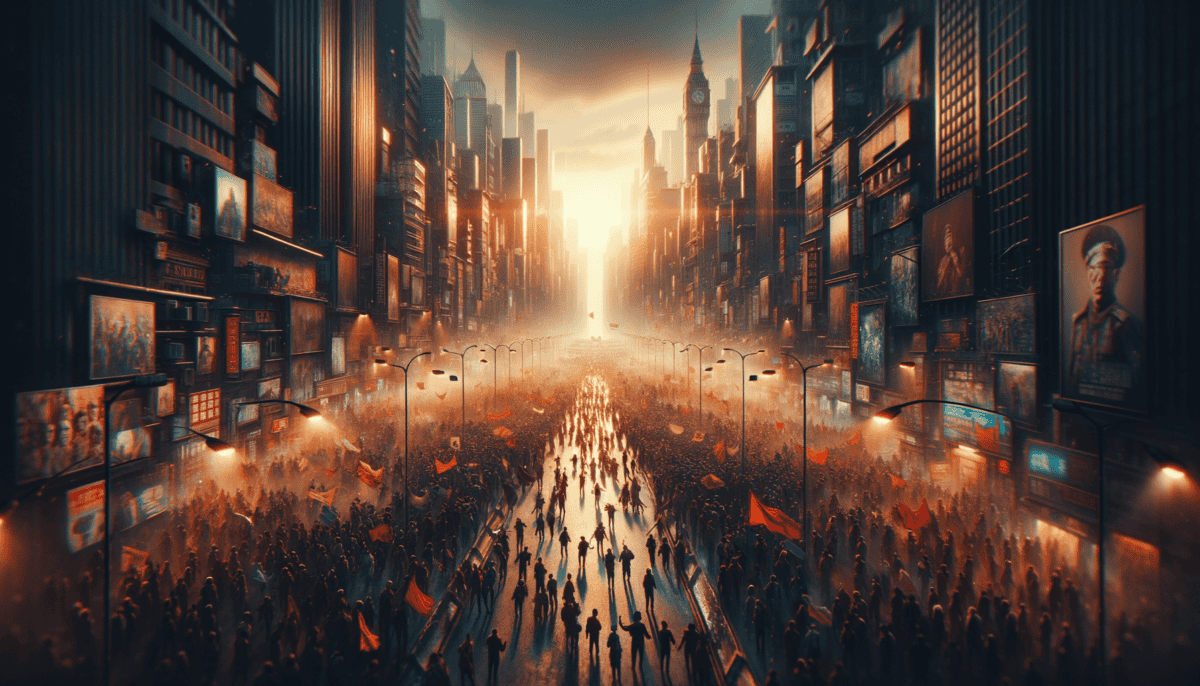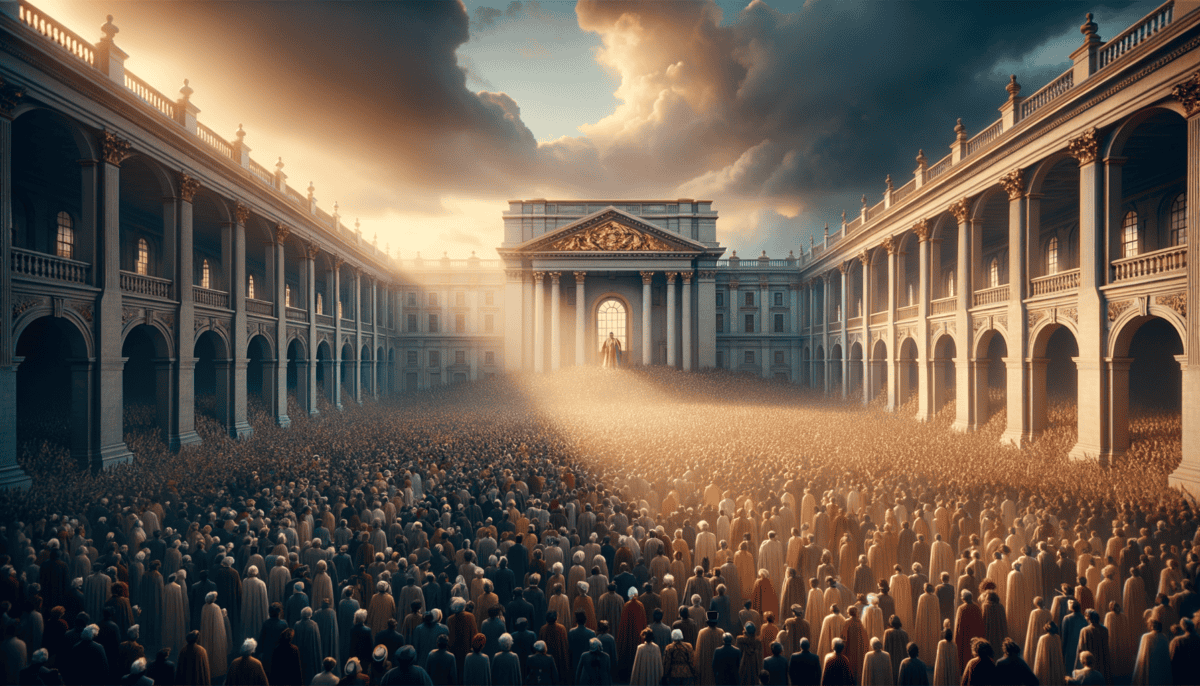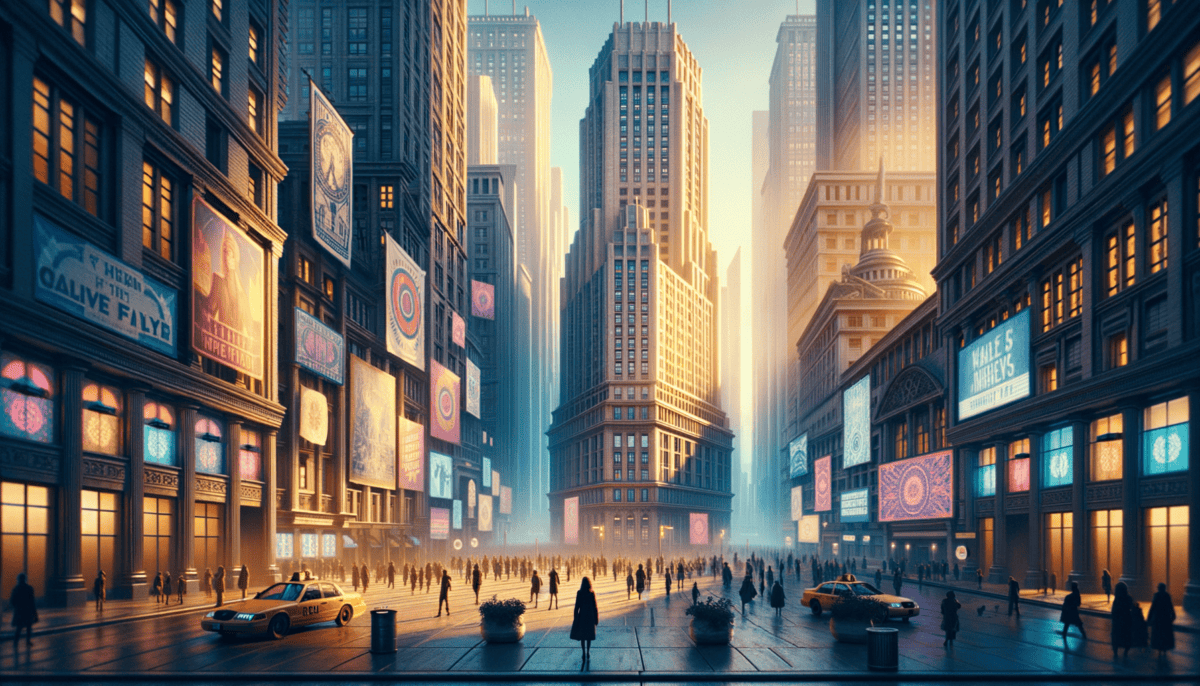The Golden Cage
The big palace sparkled like a giant jewel in the sun. Shah Mohammad Reza Pahlavi looked out from his golden balcony at the beautiful gardens below. Everything he could see belonged to him.
"Your Majesty," a servant bowed low. "Your breakfast is ready."
The Shah nodded and walked to a table loaded with the finest foods from around the world. Crystal glasses filled with fresh juice caught the morning light. Gold spoons and forks lay perfectly arranged on silk napkins.
But outside the palace walls, life was very different.
In the dusty streets of Tehran, little Ali walked with his mother to the market. His shoes had holes, and his tummy growled with hunger. Many people in Iran were poor, just like Ali and his family.
"Mama, why does the Shah have so much when we have so little?" Ali asked.
His mother quickly put her finger to her lips. "Shhh," she whispered. "We must not talk about such things."
Important Fact: The Shah lived in luxury while many Iranian people struggled to get enough food and clean water.
The Shah believed he was making Iran better through his "White Revolution." He wanted to make Iran more modern, like countries in Europe. But his plans weren't working the way he hoped.
"The farmers are angry again," one of the Shah's advisors reported. "They say the new farming rules are making them poorer."
The Shah frowned and waved his hand dismissively. "They don't understand what's good for them."
In the cities, students whispered in university hallways. In the mosques, religious leaders spoke about justice. In the bazaars, merchants grumbled about high prices.
Here are the main ways people were unhappy:
- No freedom to speak against the government
- Too much money spent on fancy palaces
- Not enough help for poor people
- Religious traditions being ignored
- Police treating people badly
Young Maryam sat in her classroom, watching her teacher write on the blackboard. She could hear angry voices from the street outside.
"Teacher," she asked, "why are people shouting?"
The teacher looked nervous. "Focus on your lessons, Maryam."
But the sounds of anger grew louder each day. The Shah's golden cage was starting to shake.
Late one night, the Shah stood at his window again. The lights of Tehran spread out before him like scattered diamonds. "They should be grateful," he thought. "I've given them everything."
But he was wrong. The people wanted more than just modern buildings and fancy shops. They wanted to be heard. They wanted to be free.
In the quiet neighborhoods, families gathered in their homes. They shared stories and dreams of a different Iran. An Iran where everyone had enough to eat. Where people could speak without fear.
"Times are changing," whispered Ali's father that evening. "Big changes are coming to Iran."
He was right. The golden cage was beautiful, but it couldn't hold back the winds of change forever. The story of Iran was about to take a new turn, and nothing would ever be the same again.
The night grew darker, and across Tehran, millions of lights twinkled like stars. In homes both rich and poor, people lay awake, thinking about tomorrow. Some dreamed of keeping their power, while others dreamed of taking it away. The revolution was coming, though many didn't know it yet.
Voices of Resistance
The sun was rising over Tehran when a small radio crackled to life in Hassan’s basement. People gathered close, straining to hear the forbidden voice of Ayatollah Khomeini.
“My fellow Iranians,” the voice said through the static, “we must stand together for justice.”
Hassan’s mother quickly covered the windows with thick curtains. Getting caught listening to Khomeini could mean big trouble with the Shah’s police.
Important Message: Ayatollah Khomeini spoke for many people who wanted change in Iran.
All across Iran, different groups of people were joining together to speak up:
- Shop owners closing their stores in protest
- Students writing secret newspapers
- Religious teachers sharing messages in mosques
- Workers going on strike
- Artists making protest songs
In the busy marketplace, Sarah watched her father close his carpet shop early. “But Papa, don’t we need the money?” she asked.
“Some things are more important than money, little one,” he answered, patting her head. “Sometimes we must stand up for what’s right.”
The message of change spread in creative ways. Students passed notes in their schoolbooks. Women whispered news while shopping. Taxi drivers shared stories with their passengers.
“Did you hear?” a fruit seller whispered to his customer. “The factory workers are refusing to work!”
In the universities, brave students like Zahra organized secret meetings. They typed messages on hidden paper sheets that said:
️ “We want freedom! We want justice! We want change!”
Young Ahmad helped his uncle pass out these messages at night. His heart beat fast every time he saw the Shah’s police cars drive by.
“Why are we doing this, Uncle?” Ahmad asked.
“Because,” his uncle replied softly, “everyone’s voice deserves to be heard.”
In the mosques, religious leaders spoke in code words that everyone understood. “The night is darkest before dawn,” they would say, meaning change was coming.
The Movement Grows Stronger
Every day, more people joined the movement. Workers left their jobs. Teachers stopped teaching. Even doctors in hospitals said they would only help emergency patients.
Little Fatima noticed changes in her neighborhood. “Mama, why are there so many closed shops?”
“The shopkeepers are speaking with their silence,” her mother explained.
At night, people climbed to their rooftops and shouted:
“Allah-u-Akbar! God is Great!” The sound echoed across the city, growing louder each night.
The Shah’s soldiers tried to stop the protests, but they couldn’t stop the whispers, the secret messages, or the hopes of millions of people.
In Hassan’s basement, the radio crackled again. More people squeezed in to listen. They were no longer afraid to stand together.
“Look,” Hassan’s father pointed to the window, “more lights are going out in protest.”
One by one, windows across Tehran went dark. But in the darkness, hope burned brighter than ever. The voice of the people was growing stronger, and soon it would be impossible to ignore.
That night, as the stars twinkled above Tehran, millions of hearts beat as one. The time for change was coming, and everyone could feel it in the air.
The Gathering Storm
The streets of Tehran buzzed with energy on that hot summer morning in 1978. Little Maryam watched from her window as more people than ever filled the streets.
“Look, Baba!” she called to her father. “The whole city is walking today!”
Her father nodded gravely. “Yes, sweetheart. Today is different.”
⚡ Historic Moment: This was the biggest protest Iran had ever seen.
The air felt thick with hope and worry. Shop windows were covered with newspapers. The smell of burning tires mixed with the sweet scent of bread from the few bakeries still open.
“Where is everyone going?” Maryam asked.
“To make their voices heard,” her father replied, taking her hand. “Sometimes people need to stand together to make things better.”
In the streets, different voices joined as one:
- Teachers walking with their students
- Doctors in white coats
- Workers from the oil fields
- Mothers carrying babies
- Grandparents walking slowly but surely
The Shah’s soldiers looked nervous. Their big tanks couldn’t stop the ocean of people flowing through the streets.
“Put down your guns!” someone shouted. “Join your brothers and sisters!”
Some soldiers wiped tears from their eyes. A few even smiled at the protesters.
The world was watching. Television crews from other countries pointed their cameras at the crowds. News about Iran filled newspapers everywhere.
“MILLIONS MARCH IN IRAN” – The headlines screamed
In America, President Carter was worried. He called the Shah on the phone.
“What’s happening in your country?” he asked.
The Shah’s voice trembled. “I… I don’t know anymore.”
Back in Tehran, little Ali helped his grandmother make extra bread for the protesters.
“Why are you making so much, Grandmother?”
“Because, my dear,” she smiled, “when people stand together, we must help feed their courage.”
The Storm Grows Stronger
Every day brought new changes. The big oil workers stopped working, which meant less gasoline for cars. Many schools closed. Even the fancy hotels where rich people stayed shut their doors.
At night, the city no longer slept. People banged pots and pans from their windows. The sound was like thunder:
BANG! BANG! BANG!
“Freedom! Freedom! Freedom!”
Young Reza watched his parents whispering over the radio at night. Strange new words filled their conversations: “Revolution,” “Republic,” “Change.”
“What’s going to happen?” he asked his mother.
She hugged him tight. “Something big, my love. Something that will change everything.”
The Shah’s soldiers tried using water cannons to stop the protests. But people just got back up, wiped off the water, and kept marching.
“You can’t wash away our hopes!” they shouted.
In mosques, markets, and homes, people shared food and stories. They took care of each other. Those who had extra gave to those who had little.
Old Mr. Hamid, who owned the corner store, wrote in his diary:
“I’ve never seen anything like this. Rich and poor, young and old, all walking together. Something powerful is happening.”
As the sun set that evening, Maryam and her father stood on their roof. The whole city seemed to glow with an inner light.
“The storm is coming, isn’t it, Baba?” she asked.
He squeezed her hand. “Yes, my dear. But after every storm comes a new day.”
Across Tehran, millions of candles flickered in windows. The light of change was spreading, and nothing could stop it now.
The Tide Turns
The winter of 1979 brought more than just cold winds to Tehran. ️ Change was in the air, and everyone could feel it.
“The Shah is leaving!” The news spread through the streets like wildfire. Little Maryam watched from her balcony as people danced in celebration.
On January 16, 1979, the Shah and his family boarded a plane and left Iran forever.
“Where is he going, Mama?” Maryam asked.
“Far away,” her mother replied, tears in her eyes. “Things will be very different now.”
Two weeks later, something even bigger happened. Ayatollah Khomeini, who had been forced to leave Iran many years ago, was coming home. The streets were packed with millions of people waiting to welcome him.
Ali and his grandmother joined the crowds at the airport.
“Look!” Ali pointed at the sky. “Is that his plane?”
His grandmother nodded, wiping happy tears from her face. “Yes, habibi. After fifteen years, he’s finally coming home.”
A City Transforms
The old government buildings looked different now. The fancy guards were gone. Regular people walked in and out, carrying boxes and papers.
“What’s happening to all the Shah’s things?” Reza asked his father.
“The people are taking their country back,” his father explained. “Everything is changing.”
️ The royal palace became a museum where regular people could visit.
In schools, teachers took down the Shah’s picture. Children brought in new books and songs. The old rules were being replaced with new ones.
But not everyone was happy about the changes.
Some of Maryam’s neighbors packed their bags and left. “We’re going to America,” her friend Sara said goodbye. “My parents say it’s not safe here anymore.”
The streets filled with different sounds now:
- Prayer calls from mosques
- Revolutionary songs on loudspeakers
- People debating the new rules
- Children chanting new slogans
- Women discussing their roles
Mr. Hamid’s corner store changed too. He replaced the fancy foreign snacks with local treats. “We must support our own people now,” he said proudly.
Big Changes Come Fast
Khomeini spoke to huge crowds. His words echoed through radio speakers in every home:
“This is your revolution! This is your country!”
Little Maryam noticed her mother wearing a new headscarf. “Why are you wearing that, Mama?”
“It’s part of the new rules, sweetheart. Many things are changing.”
Women’s clothing became a big topic of discussion in the new Iran.
At school, boys and girls now sat in separate classrooms. The playground had a line down the middle.
“But how will I play with my friend Hassan?” Maryam wondered.
Her teacher smiled kindly. “These are new times, Maryam. We must all adjust.”
A New Flag Rises
One morning, everyone gathered in the town square. The old imperial flag came down, and a new flag went up. It had different colors and new symbols.
“Look at the writing in the middle,” Ali’s grandmother pointed. “It says ‘Allah’ – God’s name.”
The crowd cheered as the new flag caught the wind. Some cried happy tears, others looked worried. Change was happening so fast.
That night, Maryam’s father wrote in his journal:
“We achieved what seemed impossible. But now comes the hard part – building something new.”
As spring approached, the city felt different. Old buildings got new names. Streets were renamed. Even the money changed, with new faces on the bills.
Reza held up a new coin. “Look, the Shah’s face is gone!”
His mother nodded. “Yes, because power now belongs to the people.”
The tide had turned completely. Iran would never be the same again. But what kind of country would it become? That was the question on everyone’s minds as they watched their world transform day by day.
A New Dawn Rises
The warm spring sun shone down on Tehran as people adjusted to their new way of life. The year was 1979, and Iran had become an Islamic Republic.
“Look, Baba!” little Amir pointed to the new sign being hung at his school. “They changed the name!”
His father nodded. “Everything is changing, my son. We are building a new Iran.”
Mosques became more than just places of prayer – they were now centers of community life.
Ayatollah Khomeini’s picture appeared everywhere. His quiet smile watched over streets, schools, and shops. People called him the Supreme Leader now.
New Rules, New Life
Sarah watched her mother pack away her colorful dresses. “Why are you putting those away, Mama?”
“We dress differently now,” her mother explained, pulling out darker, looser clothes. “It’s part of our new Islamic values.”
In the streets, changes happened fast:
- Movies showed different stories
- Music changed its tune
- Shops closed for prayer time
- Schools taught new lessons
- Newspapers wrote different words
Some people danced with joy at the changes. Others whispered worries behind closed doors.
Little Zahra noticed her neighbor’s empty house. “Where did Ms. Mina go?”
“Some people chose to leave,” her grandmother said softly. “Change is hard for everyone.”
✈️ Many families left Iran, looking for different lives in other countries.
A New Way of Learning
In school, Teacher Fatima opened new textbooks. “Today, we learn about our Islamic heroes,” she announced.
The children sat straighter. Everything felt important now, like they were part of something big.
“Will we still learn about science?” Ahmad raised his hand.
“Of course!” Teacher Fatima smiled. “But now we learn how it fits with our faith.”
Power Shifts
Downtown, the old royal palace became a museum. People lined up to see how the Shah had lived.
“Look at all this gold!” gasped Hassan, peeking through velvet ropes.
His mother squeezed his hand. “Now it belongs to all of us.”
The people’s revolution turned royal spaces into public places.
But not everything was peaceful. Some groups disagreed about Iran’s new direction.
“Why are they arguing, Baba?” Amir asked, hearing loud voices in the street.
“Because big changes bring big feelings,” his father explained. “Some want things one way, others want something different.”
New Faces of Power
The Revolutionary Guards appeared on street corners, wearing green bands on their arms. They made sure everyone followed the new rules.
“Stand straight! Fix your scarf!” they called to passing women.
Young Mina watched them from her window. “They look serious,” she whispered to her cat.
New leaders rose up as old ones stepped down or left.
In the markets, merchants changed their signs to Islamic phrases. The smell of local spices replaced foreign perfumes.
“We support our own people now,” Mr. Karimi said proudly, displaying his Iranian-made goods.
Dreams and Worries
At night, families gathered around radios, listening to news about their changing country.
“Will things be better now?” Sarah asked her grandfather.
He stroked his beard thoughtfully. “Change takes time, my dear. We must be patient.”
Outside, the evening call to prayer echoed through streets where revolutionary songs had recently rung out. Iran was becoming something new, something different.
The moon rose over a changed Tehran, watching as people dreamed of what tomorrow might bring.
Young Ali wrote in his notebook that night: “Our city looks the same but feels different. Like when you rearrange all the furniture in your room – everything’s there, but nothing’s where it used to be.”
Legacy of Change
The warm breeze carried the scent of saffron through Tehran’s streets. Forty years had passed since the revolution changed Iran forever. ️
Young Neda sat with her grandmother in their garden, looking at old photographs. “Tell me about the revolution again, Maman-bozorg.”
“These pictures tell the story of how Iran changed,” Grandmother Sara smiled, touching a faded image.
Memories and Modern Life
“Back then, we thought everything would be perfect right away,” Grandmother Sara explained. “But life is never that simple.”
Neda picked up a photo of women in colorful 1970s dresses. “They dressed so differently!”
“Yes, and now we have our own style,” Sara touched her dark headscarf. “Some things changed quickly, others took years.”
The biggest changes in Iran after the revolution were:
- New ways of dressing
- Different school lessons
- More religious rules
- New friends and enemies
- Changed relationships with other countries
Today’s Iran
Neda’s phone buzzed with a message from her friend Maryam: “Did you finish the computer project? “
“See?” Grandmother Sara laughed. “We worried technology would disappear, but look at you now – talking to friends through tiny computers!”
Modern Iran mixed old traditions with new ideas, like a beautiful Persian carpet with both old and new patterns.
In the streets, young people hurried past revolutionary murals, carrying laptops and smartphones. Women in colorful headscarves rode bikes and drove cars.
“Some things got better, some got harder,” Grandmother Sara explained. “That’s how big changes work.”
Stories That Live On
At school, Neda’s teacher Ms. Fatima asked the class to interview family members about the revolution.
“My uncle left Iran,” shared Ali. “But he still calls us every week.”
“My mom was just a baby,” added Zahra. “She grew up in the new Iran.”
️ Everyone had different memories, different stories to tell.
Looking Forward
After school, Neda watched young artists painting new murals beside the old revolutionary ones.
“Why do they keep the old paintings?” she asked her father.
“To remember where we came from,” he explained. “Every country needs its history to help guide its future.”
The sunset painted Tehran’s sky in beautiful colors, just as it had done during the revolution.
Iran’s story continued to unfold, shaped by its past but not trapped by it.
That evening, Neda wrote in her diary: “My grandmother’s Iran was different from mine. Maybe my children’s Iran will be different too. But we’re all part of the same big story.”
As night fell over Tehran, lights twinkled in millions of homes. In each one, families shared meals, told stories, and dreamed of tomorrow. The revolution had changed Iran forever, but Iran’s heart – its people, their hopes, and their dreams – kept beating strong.
⭐ The stars above Tehran watched over a country still writing its story, page by page, day by day.






